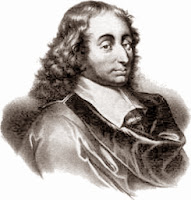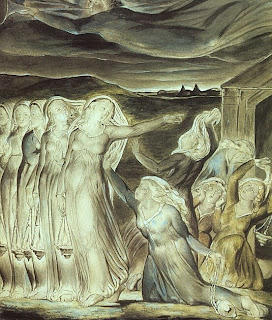 Today's Gospel from Luke (18: 9-14) presents the familiar parable about the Pharisee and the tax collector who go to the temple to pray. The Pharisee, wrapped in his own self-righteousness praises God that he is not like 'other men' in their foibles, imperfections, and sin. The tax collector, unable to even raise his eyes, proclaims, "have mercy on me a sinner". Perhaps the Pharisee was a better man, perhaps the tax collector was deserving of all the self-condemnation that he could muster, but the question Jesus gets at is, whose prayer was heard by God? The Pharisee was the center of gravity in his oration... using the personal pronoun "I" no less than 4 times in the short verse we get in the Gospel (at least in the English version). He was separate from God and separate from other men in his self-justification... in a bizarre kind of isolation caused by his status as a 'religious person'. The tax collector had no illusions about himself, other than being in need of God and in need of reconciliation with God and, presumably, his fellow man.
Today's Gospel from Luke (18: 9-14) presents the familiar parable about the Pharisee and the tax collector who go to the temple to pray. The Pharisee, wrapped in his own self-righteousness praises God that he is not like 'other men' in their foibles, imperfections, and sin. The tax collector, unable to even raise his eyes, proclaims, "have mercy on me a sinner". Perhaps the Pharisee was a better man, perhaps the tax collector was deserving of all the self-condemnation that he could muster, but the question Jesus gets at is, whose prayer was heard by God? The Pharisee was the center of gravity in his oration... using the personal pronoun "I" no less than 4 times in the short verse we get in the Gospel (at least in the English version). He was separate from God and separate from other men in his self-justification... in a bizarre kind of isolation caused by his status as a 'religious person'. The tax collector had no illusions about himself, other than being in need of God and in need of reconciliation with God and, presumably, his fellow man.
As I preached to a house of sisters this morning, standing among them in their Sunday habits, myself wearing the ornate vestments which are part of celebrating Mass, I could not help but muse on the dangers of 'being separate'... for we are. That separateness is in circumstance and practice however, but not in substance. It is a separation in service, not in need. It is to be a sheep-ish shepherd among the flock, "smell[ing] like their sheep", as Pope Francis remarked at his first Chrism Mass.
The sheep share a deep communion and identity with the Lamb once slain. Indeed, the Lord embraced our humanity as something not beneath him, that he could live our life and die our death, feeding us with his Body and Blood, that we could have his life in eternity. If we find that our prayer separates us from our humanity, Christ's humanity, and/or our relationship with others, then I think there's a clue that we are on the wrong path.
 There is a radiant passage from Thomas Merton's 1966 book, Conjectures of a Guilty Bystander, which I think provides the perfect antidote to that sense of separation which the religious life (and religious service in general) threatens. Indeed that separation not only yields the fearful tendency towards unreflective and smug self-righteousness, but perhaps sometimes in the more-recollected, it yields that death-dealing feeling of inadequacy or dualism between what one is and what one hopes to become. For many in this latter mind-set fearfully aspire to become, as Merton calls it, a pseudo-angel, rather than fully human. (Been there, done that, have the trophy.) In this parable, then, the challenge is to embrace the humanity that Christ himself embraces, while engaged in the struggle to finish the race and obtain the crown of righteousness in God's grace alone. (cf. 2 Tim 4: 6-8, 16-18, which is our second reading.) Without further ado, here's Merton:
There is a radiant passage from Thomas Merton's 1966 book, Conjectures of a Guilty Bystander, which I think provides the perfect antidote to that sense of separation which the religious life (and religious service in general) threatens. Indeed that separation not only yields the fearful tendency towards unreflective and smug self-righteousness, but perhaps sometimes in the more-recollected, it yields that death-dealing feeling of inadequacy or dualism between what one is and what one hopes to become. For many in this latter mind-set fearfully aspire to become, as Merton calls it, a pseudo-angel, rather than fully human. (Been there, done that, have the trophy.) In this parable, then, the challenge is to embrace the humanity that Christ himself embraces, while engaged in the struggle to finish the race and obtain the crown of righteousness in God's grace alone. (cf. 2 Tim 4: 6-8, 16-18, which is our second reading.) Without further ado, here's Merton:
 In Louisville, at the corner of Fourth and Walnut [less than a block from the Cathedral of the Assumption], in the center of the shopping district, I was suddenly overwhelmed with the realization that I loved all those people, that they were mine and I was theirs, that we could not be alien to one another even though we were total strangers. It was like waking from a dream of separateness, of spurious self-isolation in a special world, the world of renunciation and supposed holiness. The whole illusion of a separate holy existence is a dream. Not that I question the reality of my vocation, or of my monastic life: but the conception of "separation from the world" that we have in the monastery too easily presents itself as a complete illusion: the illusion that by taking vows we become a different species of being, pseudo-angels, "spiritual men", men of interior life, what have you.
In Louisville, at the corner of Fourth and Walnut [less than a block from the Cathedral of the Assumption], in the center of the shopping district, I was suddenly overwhelmed with the realization that I loved all those people, that they were mine and I was theirs, that we could not be alien to one another even though we were total strangers. It was like waking from a dream of separateness, of spurious self-isolation in a special world, the world of renunciation and supposed holiness. The whole illusion of a separate holy existence is a dream. Not that I question the reality of my vocation, or of my monastic life: but the conception of "separation from the world" that we have in the monastery too easily presents itself as a complete illusion: the illusion that by taking vows we become a different species of being, pseudo-angels, "spiritual men", men of interior life, what have you.
Certainly these traditional values are very real, but their reality is not an order outside everyday existence in a contingent world, nor does it entitle one to despise the secular: though "out of the world" we are in the same world as everybody else, the world of the bomb, the world of race-hatred, the world of technology, the world of mass media, big business, revolution, and all the rest. We take a different attitude to all these things, for we belong to God. Yet so does everybody else belong to God. We just happen to be conscious of it, and to make a profession out of this consciousness. But does that entitle us to consider ourselves different, or even better, than others?
This sense of liberation from an illusory difference was such a relief and such a joy to me that I almost laughed out loud. And I suppose my happiness could have taken form in the words: "Thank God, thank God that I am like other men, that I am only a man among others." To think that for sixteen or seventeen years I have been taking seriously this pure illusion that is implicit in so much of our monastic thinking.
It is a glorious destiny to be a member of the human race, though it is a race dedicated to many absurdities and one which makes terrible mistakes; yet, with all that, God himself glorified in becoming a member of the human race. A member of the human race! To think that such a commonplace realization should suddenly seem like news that one holds the winning ticket in a cosmic sweepstake.
I have the immense joy of being man, a member of a race in which God Himself became incarnate. As if the sorrows and stupidities of the human condition could overwhelm me, now I realize what we all are. And if only everybody could realize this! But it cannot be explained. There is no way of telling people that they are all walking around like the shining sun!
This changes nothing in the sense and value of my solitude, for it is in fact the function of solitude to make one realize such things with a clarity that would be impossible to anyone completely immersed in the other cares, the other illusions, and all the automatisms of a tightly collective existence. My solitude, however, is not my own, for I see now how much it belongs to them — and that I have a responsibility for it in their regard, not just in my own. It is because I am one with them that I owe it to them to be alone, and when I am alone, they are not “they” but my own self. There are no strangers!
Then it was as if I suddenly saw the secret beauty of their hearts, the depths of their hearts where neither sin nor desire nor self-knowledge can reach, the core of their reality, the person that each one is in God’s eyes. If only they could all see themselves as they really are. If only we could see each other that way all the time. There would be no more war, no more hatred, no more cruelty, no more greed…I suppose the big problem would be that we would fall down and worship each other. But this cannot be seen, only believed and “understood” by a peculiar gift.































